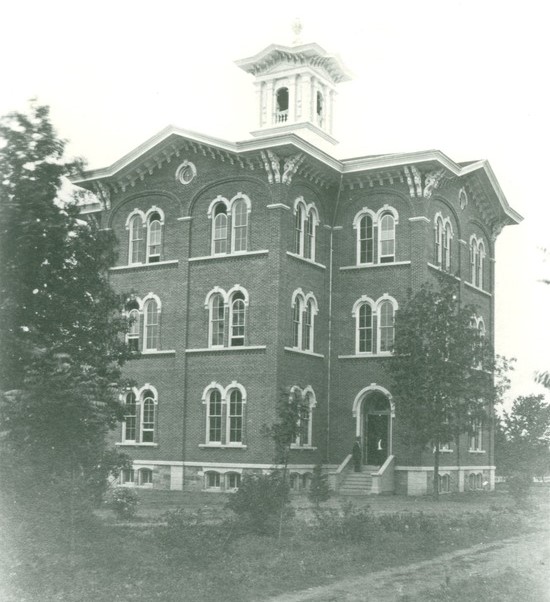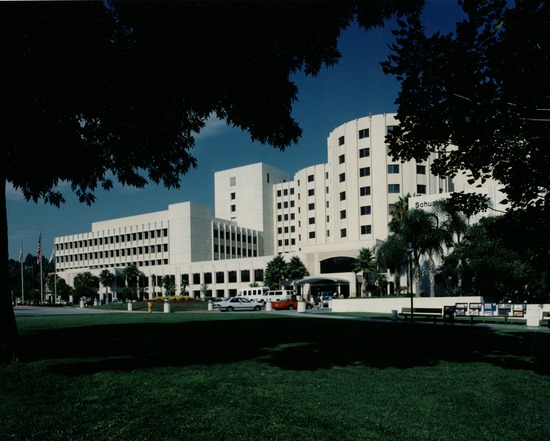On the outside, Seventh-day Adventist universities may not look much different than other college campuses. But the real differences are beneath the surface.
Adventist Universities are all about helping each student have a fulfilling educational journey on a Christ-centered campus. Lifelong friendships are forged. Pivotal career decisions are made. And the supportive spiritual environment can help students grow in immeasurable ways.
Let’s take a closer look at what makes Adventist universities so loved by both their alumni and their surrounding communities.
- The story of the Adventist college
- What is the mission of Adventist universities?
- Why would someone choose an Adventist university?
- Adventist universities in North America
We’ll start with some history.
The story of the Adventist college

Battle Creek College, Battle Creek, Michigan
The first Adventist college was born in 1874 with Michigan’s Battle Creek College (present-day Andrews University). The Adventist Church was exceptionally committed to quality education, especially coming out of a time when the United States was more industrially focused than scholastically focused.
These campuses also provided a place to formally train pastors and teachers, as well as other professions that were in high demand for mission service.
A few years later, Pacific Union College’s forefather, Healdsburg College, opened in 1882.
This was closely followed by the Battle Creek College Training School for Nurses within the Battle Creek Sanitarium, which spurred the development of Adventist nursing schools, hospitals, and eventually, medical schools.
In 1895, the Sanitarium began the first Adventist medical school, American Medical Missionary College.
In 1893, Claremont Union College in South Africa became the first Adventist college outside the United States. Soon after, Adventist universities opened in Australia, South America, and Europe, respectively.
Today, Adventist universities have blossomed everywhere. There are currently 117 Adventist colleges dotting the globe,1 forming the second largest Christian school network in the world.2
What is the mission of Adventist universities?
Originally, Adventist education began with the purpose of training denominational workers and providing children with a higher quality education than was typically available at the time.3
Today, the goal isn’t much different: Adventist universities equip students with the necessary skills for today’s workforce, while also teaching them how their faith can be woven into everything they aspire to do.
Adventists believe that education is key when it comes to being good stewards of our minds and our talents. This echoes the Bible’s emphasis that pursuing knowledge and getting to know God goes hand in hand (Proverbs 9:10).
With this in mind, Adventist colleges operated with an emphasis on each student being a unique individual with God-given gifts.4 Students were to be encouraged to use the abilities God gave them, so they can become cheerful contributors to their communities.
That’s why Adventist universities provide a well-rounded education to promote spiritual, mental, physical, and social health, intellectual growth, and service.5
Along with serving, Adventist universities promote excellence, intelligence, engagement, and community. All these support the umbrella of faith, to best equip students to relay the gospel to the world.6
And if anyone is considering a career in health care, an Adventist university can be a terrific fit due to the special emphasis Adventists place on the need for caring, quality medical care.
Let’s take a look at some of the specific reasons people choose Adventist colleges.
Why would someone choose an Adventist university?

Photo by Ivan Samkov
A number of things set Adventist universities and colleges apart.
- Variety of quality programs: Adventist universities offer competitive programs in a wide range of majors. For example, Southern Adventist University is known for its nursing program, which is in the top 20% in the United States.7 La Sierra University’s Enactus business team has won two Enactus world cups.8 And Loma Linda University is considered one of the best medical schools in the U.S.9
- Competitive graduation rates: Most Adventist universities have a graduation rate at or above the national average of 55%. Andrews University, for example, hands diplomas to 61% of its undergraduates.10 Loma Linda University graduates 87% of its students.11 Most of the other Adventist campuses range from 50%-59%.
-
Diversity: Attracting students from all over the world causes Adventist campuses to be diverse places, which can enrich the educational experience. As of 2018, Andrews University ranked #1 in campus ethnic diversity. That year, 20% of their students came from other countries.12 In 2021, La Sierra University took the same prize.13 Adventists are not the only students who attend, either. So many students from other faiths and philosophies want to attend that in some cases, they almost double the enrollment.14
- Close-knit campuses: Adventist colleges tend to have a smaller student body. Their U.S. schools range from 754 students (Southwestern Adventist University) to 4,514 (Loma Linda University). Compare this to the numbers of all other American universities, which are as high as 63,124.15 Students at large universities can feel like just a number, while smaller universities help students feel like a meaningful part of the community.
- Smaller student-faculty ratio: Smaller classes also mean more one-on-one attention from the professors. The average student faculty ratio in North American Adventist colleges is 11:1, with the national average at 14:1.16 In these close-knit environments, students can build strong, lasting relationships.
- Biblical emphasis: Throughout all parts of the college experience, students learn how the Bible can be part of everything. This is even woven into the class structure. For example, Southern Adventist University asks professors to create a biblical course design model for each class they teach. This incorporates faith with the practical skills students learn.17 It’s also common for professors to offer prayer before class and sometimes share a Bible text or relevant devotional thought.
- Athletics: Some schools emphasize athletics more than others, but every school has some form of sports or activity options. Southern Adventist University students, for example, play only intramural sports. All competition is within Southern’s teams. Washington Adventist University, however, is more heavily involved in athletics. Their campus’ team, The Shock, is part of NAIA and USCAA and competes in basketball, cross country, volleyball, and soccer.18
How can I attend an Adventist university?
Attending an Adventist university is relatively easy. You don’t have to worry about a massive number of students also applying for the same program.
A quick search can tell you which Adventist university is closest to you, or you can look up several of them to see which ones have the programs you’re interested in. You can schedule a visit first, or you can dive right into the application process.
Yes, Adventist schools are private institutions and tend to have a heftier price tag. The average 2022 tuition and fees of Adventist universities in the United States is $25,707, with Kettering College the lowest at $14,23219 and Loma Linda the highest at $36,000.20 However, most schools offer scholarships to help ease the financial burden. Other financial aid is also available. Be sure to check out what each Adventist university offers.
Adventist universities in North America
In the North American Division, 13 universities and colleges serve their students.
- AdventHealth University: Situated in Orlando, Florida, AdventHealth trains students to become medical professionals in a wide range of areas.
- Andrews University: One of the most culturally diverse universities in the United States, Andrews attracts students to its campus in Berrien Springs, Michigan. It is particularly known for its theological seminary.
- Burman University: Canada’s “light on the hill” serves students from Lacombe, Alberta. It is best known for its program in education.
- Kettering College: Located in Kettering, Ohio, this is a place for students seeking medical degrees.
- La Sierra University: Located only 60 miles from Los Angeles, La Sierra has a prominent degree in criminal justice.
- Loma Linda University: Loma Linda is a large California university best known for its robust graduate medical programs.

Loma Linda University, Loma Linda, California
- Oakwood University: Historically founded to educate former slaves, Alabama’s Oakwood University is best known for its degrees in liberal arts and humanities.
- Pacific Union College: This college in Angwin, California, serves specifically undergraduates and is the largest source for Loma Linda University’s School of Medicine.
- Southern Adventist University: Based in Collegedale, Tennessee, Southern has an exceptional nursing program and other sciences.
- Southwestern Adventist University: Southwestern offers a unique degree in Fire Science. The university is located in Keene, Texas.
- Union College: Located in the heart of the great plains, this college is noted for its rescue program.
- Walla Walla University: Positioned near Walla Walla, Washington, this university boasts well-known engineering and nursing programs.
- Washington Adventist University: Located a stone’s throw from Washington, D.C., Washington has a strong nursing program and puts a high emphasis on athletics.
The church also operates a number of other universities around the world:
- Africa: 25
- Angola
- Botswana
- Cameroon
- Democratic Republic of Congo
- Ethiopia
- Ghana
- Kenya
- Liberia
- Madagascar
- Malawi
- Nigeria
- Rwanda
- South Africa
- Tanzania
- Uganda
- Zambia
- Zimbabwe
- Asia: 27
- Bangladesh
- China
- India
- Indonesia
- Japan
- Lebanon
- Malaysia
- Myanmar
- Pakistan
- South Korea
- Sri Lanka
- Taiwan
- Thailand
- Australia: 2
- Europe: 16
- Croatia
- Denmark
- Finland
- France
- Germany
- Hungary
- Italy
- Norway
- Poland
- Romania
- Russia
- Sweden
- Ukraine
- United Kingdom
- North and Central America: 29
- Belize
- Canada
- Costa Rica
- Cuba
- Dominican Republic
- Haiti
- Jamaica
- Mexico
- Puerto Rico
- Trinidad and Tobago
- United States of America
- Venezuela
- Pacific Ocean Islands: 15
- Fiji
- Papua New Guinea
- Philippines
- South America: 18
- Argentina
- Bolivia
- Brazil
- Chile
- Colombia
- Ecuador
- Peru
- Uruguay
Some of the most noteworthy universities around the world include:
- Adventist University of Africa: from Kenya, this institution was built to educate post-graduates in Africa. It offers theological, business, leadership, public health, and computer science degrees.
- Adventist University of France: Also called Campus Adventiste du Salève, this university is the only French-speaking Adventist institution in Europe.
- Adventist University of the Philippines: Based in Puting Kahoy, Silang, Cavite, Philippines, this school offers degrees ranging from the arts to medicine.
- Avondale University: Australia’s university in New South Wales offers a variety of programs and has a well-known nursing program.
- Newbold College: Situated in Binfield, Great Britain, students can earn a variety of religion, liberal arts, and business degrees. The school is part of Adventist Colleges Abroad.
- University of Montemorelos: One of five Adventist universities globally that grants degrees in medicine, this college in Nuevo León, Mexico, offers a large selection of programs.
Adventist universities are not only a place to earn a degree. They prepare the student for being a good citizen in their community and serving others. As Colossians 3:23-24 says, all of our work should be done well, as if for God. And this underlying principle fuels the pursuits of each Adventist higher learning institution.
- Adventist Universities.com, Adventist Universities, Accessed July 14, 2022, https://adventistuniversities.com/. [↵]
- “About Seventh-day Adventist Education,” Adventist Universities.com, Adventist Universities, Accesses July 14, 2022, https://adventistuniversities.com/adventist-education/. [↵]
- “The Birth of Adventist Education,” Lineage Journey.com, Present Lineage Journey, Accessed July 29, 2022, https://lineagejourney.com/read/the-birth-of-adventist-education/. [↵]
- Ibid. [↵]
- Ibid. [↵]
- Taylor, John Wesley V, “What is the Special Character of an Adventist College or University?”, Adventist.org, The Journal of Adventist Education, Accessed July 13, 2022, https://jae.adventist.org/2017.2.5. [↵]
- “Nursing Ranking 2022: Southern Adventist University,” Best Nursing Colleges.com, Best Nursing Colleges, Accessed July 14, 2022, https://best-nursing-colleges.com/southern-adventist-university. [↵]
- https://lasierra.edu/business/impact/ [↵]
- “Loma Linda University School of Medicine Ranking: How to Get Into?” MACThub.com, MCAT Hub, Accessed July 14, 2022, https://mcathub.com/loma-linda-university-school-of-medicine-ranking/. [↵]
- “Andrews University,” College Evaluator.com, College Evaluator, Accessed July 28, 2022, https://www.collegeevaluator.com/institute/andrews-university/. [↵]
- “Loma Linda University Graduation Rates and Retention Rates,” College Factual.com, College Factual, Accessed July 28, 2022. [↵]
- “Andrews University Ranked #1 for Ethnic Diversity,” Andrews.edu, Andrews Agenda, Accessed July 29, 2022, https://www.andrews.edu/agenda/47237/. [↵]
- Tucker, Darla Martin. “Wall Street Journal Again Ranks La Sierra No. 1 in Nation For Diversity,” La Sierra.edu, La Sierra University, Accessed July 29, 2022, https://lasierra.edu/article/wall-street-journal-again-ranks-la-sierra-no-1-in-nation-for-diversity/. [↵]
- Wright, Jard, “Recruiting Non-Adventist Students Already the Norm in Adventist Higher Education,” Spectrum Magazine.org, Spectrum Magazine, Accessed July 13, 2022, https://spectrummagazine.org/article/2017/04/26/recruiting-non-adventist-students-already-norm-adventist-higher-education. [↵]
- Wood, Sarah, “10 Colleges with the Most Undergraduate Students,” US News.com, USNews, Accessed July 29, 2022, https://www.usnews.com/education/best-colleges/the-short-list-college/articles/colleges-with-the-most-undergraduates. [↵]
- “US Colleges Student to Faculty Ratio Statistics,” Univstats.com, Univstats, Accessed July 29, 2022, https://www.univstats.com/corestats/student-faculty-ratio/. [↵]
- “Biblical Course Design Model,” Southern.edu, Southern Adventist University, Accessed July 29, 2022,https://www.southern.edu/administration/cte/BiblicalFoundations/BiblicalCourseDesignModel.html. [↵]
- “Washington Adventist University Athletics,” Adventist Colleges.com, Adventist Colleges and Universities, Accessed July 28, 2022, https://adventistcolleges.org/athletics/washington-adventist-university-athletics/. [↵]
- “Kettering College,” College Tuition Compare.com, College Tuition Compare, Accessed July 28, 2022, https://www.collegetuitioncompare.com/edu/203544/kettering-college. [↵]
- “Loma Linda University,” College Tuition Compare.com, College Tuition Compare, Accessed July 28, 2022, https://www.collegetuitioncompare.com/edu/117636/loma-linda-university. [↵]
Related Articles
More Answers
Who Are Adventists
The Seventh-day Adventist Church—“Adventists” for short—is a Christian denomination of ordinary people who seek to follow Jesus and live out His mission in this world. Established in 1863, we hold to the Protestant principle of sola scriptura, which means the Bible guides everything we do.
Life Lessons from Joseph in the Bible
Joseph is one of the more well-known people from the Bible’s Old Testament. He showed remarkable strength, faith, and patience—even while facing great difficulty and injustice. All because he let God lead.
Understanding Prophecy in the Bible
Seventh-day Adventists have emphasized Bible prophecy from the beginning. We have our roots in the study of God’s Word, especially the prophecies that have to do with the future.
How Do You Tell a False Prophet From a True Prophet?
The Bible speaks of both true and false prophets and gives us specific guidance on how to test prophets and their claims. Scripture is our guard against deception.
All About the Old Testament
The Old Testament is the first section of the Bible and makes up about three-quarters of its material. It lays out the story of Creation, humanity’s fall into sin, and God’s promise to rescue us from sin.
Why is There Good and Evil in the World?
Human nature is capable of the most self-sacrificing and heroic acts—a soldier risking his life for his country, a mother protecting her children from harm, a man jumping into a swirling current to save someone who is drowning.
What Seventh-day Adventists Believe About Growing in Christ
Christian growth is the experience of allowing Jesus Christ to work in our lives through the Holy Spirit and restore in us the image we were designed for—God’s image of selfless, other-centered love.
What Do Seventh-day Adventists Believe about the New Earth?
Seventh-day Adventist, like other Christians, believe that after the second coming of Christ, God will cleanse our earth by fire and then restore it back to Eden-like perfection.
What Adventists Believe About the Millennium and the End of Sin
As most Christians, Seventh-day Adventists hope for the time when sin and evil will no longer exist. The Bible teaches that God will bring an end to sin after a thousand-year period of time called the millennium.
What Are Seventh-day Adventists Beliefs on Death and the Resurrection?
The thought of dying can seem scary. And the idea of being resurrected—or coming back to life—can seem a little uncomfortable.
What Do Seventh-day Adventists Believe about The Second Coming of Christ?
The second coming of Jesus Christ is an event the Bible prophesies will occur at the end of this world’s history. It’s called His second coming to distinguish it from His first, when Jesus was born to Mary and lived as a human before dying on the Cross.
What Adventists Believe About Jesus’ Ministry in the Heavenly Sanctuary
The ancient Israelite sanctuary had a daily service and a yearly service. Jesus’ death on the Cross and His ministry in the heavenly sanctuary reflect these services.
What do Seventh-day Adventists Believe about Marriage and Family?
The Seventh-day Adventist Church believes God established marriage and the family unit to be blessings to humanity. They make up a relational structure that can reflect the multifaceted nature of God’s love.
What Seventh-day Adventists Believe about Christian Behavior
The patterns of actions and words that make up behavior are central to any type of belief system because they flow from those beliefs. Seventh-day Adventists look to the Bible, with Jesus as the perfect example, for guidance on shaping our daily behavior.
What do Seventh-day Adventists Believe about the Sabbath?
Seventh-day Adventists believe that the biblical Sabbath is a beautiful gift of rest that God gave to us at Creation and that remains valid to this day. Falling on the seventh day of the week—Saturday—it connects us to God in a special way and offers us a weekly opportunity to be physically, mentally, and spiritually refreshed.
What Seventh-day Adventists Believe about Stewardship (and What Does It Mean?)
Love for God and our fellow humans is the overriding principle of the Seventh-day Adventist faith. And we express that love in an overarching way through how we manage the things—material and immaterial—that God has entrusted to us.
What Do Adventists Believe About the Law of God?
Seventh-day Adventists believe that God’s law reflects His character of love (1 John 4:8; Romans 13:10). It is perfectly summarized in the Ten Commandments given to Moses on Mount Sinai, showing us the practical application of loving God and loving other people.
What Do Seventh-day Adventists Believe About the Gift of Prophecy?
Adventists believe the gift of prophecy is a spiritual gift that the Holy Spirit gives to specific individuals to help the church carry out Jesus’ Great Commission (Matthew 28:16–20). Prophecy helps strengthen, encourage, and comfort His people (1 Corinthians 14:3).
What Seventh-day Adventists Believe About Spiritual Gifts in the Bible
Seventh-day Adventists believe that spiritual gifts are talents that the Holy Spirit gives to believers and followers of Jesus Christ. These gifts are different but complementary, and they often equip followers of Christ with the ability to spread the good news about Jesus and encourage its members.
What do Seventh-day Adventists Believe about the Lord’s Supper (Communion)?
Like many Protestant Christians, Seventh-day Adventists believe in the practice commonly called the Lord’s Supper or Holy Communion. They drink grape juice and eat unleavened bread in obedience to Jesus’ direct instructions to do it in remembrance of Him (1 Corinthians 11:24–25).
What do Seventh-day Adventists Believe about Baptism?
Like many Protestant Christians worldwide and throughout history, the Seventh-day Adventist Church believes in baptism, a ceremony in which individuals go under water to publicly demonstrate dying to an old life and beginning a new life in Christ. We baptize people by immersion, as taught and exemplified in the Bible.
What Do Seventh-day Adventists Believe about Unity in Christ?
Seventh-day Adventists believe in biblical unity—the idea of believers in Jesus being united by the truth of the Bible and the common goal of representing God and His love to the world.
What do Seventh-day Adventists Believe about the Remnant and its Mission?
The “remnant” are a group of faithful believers that have existed throughout history and proclaimed God’s truth, love, and plan to save humanity. They “remain” with God even amid persecution and also when it seems everyone else has rebelled against God or compromised their beliefs.
What do Seventh-day Adventists Believe about the Church?
Seventh-day Adventists believe that the idea of the church is an important biblical concept.
Didn’t find your answer? Ask us!
We understand your concern of having questions but not knowing who to ask—we’ve felt it ourselves. When you’re ready to learn more about Adventists, send us a question! We know a thing or two about Adventists.
































